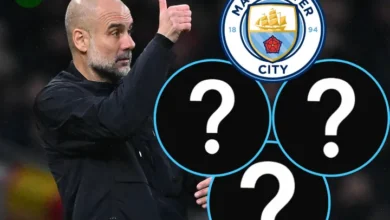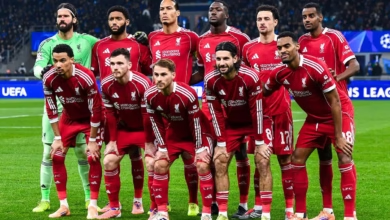ack Grealish urged to join Man City Rival to unlock ‘unlimited potential’ and show Guardiola what has been restrained at Man City

Jack Grealish: Why a Bayern Munich Move Could Reignite a Career at the Crossroads
Former Bayern Star Dietmar Hamann Believes the Manchester City Winger Could Flourish in the Bundesliga
By Claude Sports Editorial Team
April 26, 2025
Jack Grealish finds himself at a pivotal moment in his professional career. Once the Premier League’s most expensive transfer at £100 million when he moved from Aston Villa to Manchester City in the summer of 2021, the mercurial English talent has experienced both highs and lows during his time at the Etihad Stadium. After a difficult adjustment period in his first season, Grealish found his rhythm in the 2022-23 campaign, playing a crucial role in Manchester City’s historic treble. However, the 2024-25 season has seen the 29-year-old increasingly relegated to the bench, starting just seven Premier League matches under Pep Guardiola.
As Grealish’s playing time diminishes and questions about his fit in Guardiola’s system persist, former Liverpool and Bayern Munich midfielder Dietmar Hamann has made a compelling case for the Englishman to consider a move to Bavaria. Speaking to Instant Casino, Hamann expressed his belief that Grealish possesses “unlimited potential” that could be better realized in the Bundesliga.
“Jack Grealish is a player I’d really like to see at Bayern Munich,” Hamann stated. “I think he has still got unlimited potential. He has only had one standout season in four years at Manchester City, I feel like he is a free spirit both on and off the pitch and you have to let him have freedom.”
This assessment raises intriguing questions about Grealish’s career trajectory, his compatibility with Guardiola’s system, and whether a change of scenery might benefit a player who once seemed destined for superstardom. To understand the full context of Hamann’s suggestion, we must examine Grealish’s journey at Manchester City, the tactical considerations at play, and what a potential move to Bayern Munich might mean for his future.
The Grealish Conundrum: A Star Without a Stage
When Manchester City broke the British transfer record to sign Jack Grealish in August 2021, expectations were stratospheric. At Aston Villa, Grealish had developed into one of the Premier League’s most captivating players—a throwback number 10 with close control reminiscent of Paul Gascoigne, capable of gliding past defenders with balletic grace while drawing fouls at an unprecedented rate. He was the focal point of Villa’s attack, given license to roam across the final third and make decisions that determined his boyhood club’s offensive rhythm.
The transition to Manchester City represented not just a step up in quality but a fundamental shift in playing philosophy. At Villa, Grealish touched the ball approximately 66 times per 90 minutes during his final season. The entire offensive strategy revolved around getting him the ball in dangerous areas. At City, he entered a system predicated on collective movement, positional discipline, and patient build-up play. Individual brilliance was welcomed but within the confines of a meticulously choreographed tactical framework.
Grealish’s first season at the Etihad yielded decent if unspectacular returns: six goals and four assists across all competitions. Critics questioned whether the substantial investment had been justified, while Guardiola consistently defended his new signing, emphasizing the adjustment period required for players to acclimate to his demanding system.
The 2022-23 campaign represented a significant turning point. Grealish began to find his rhythm within City’s structure, contributing crucial performances during the club’s treble-winning season. His improved defensive work rate and positional awareness complemented his natural creative abilities, resulting in five goals and seven assists in the Premier League alone. More importantly, he started the Champions League final victory over Inter Milan, vindicating Guardiola’s faith in his development.
However, the upward trajectory did not continue as expected. The emergence of Jeremy Doku and the development of Phil Foden into one of the world’s premier attacking midfielders have limited Grealish’s opportunities in the 2024-25 season. The stats tell a stark story: just seven Premier League starts by late April, compared to 20 starts at the same point in the previous campaign.
This reduction in playing time has inevitably sparked speculation about Grealish’s future at the club, with many observers noting that a player of his caliber and in his prime years cannot afford to spend extended periods on the bench. It is against this backdrop that Hamann’s comments about Bayern Munich resonate with particular significance.
The Tactical Fit: Freedom Within Structure
When analyzing Hamann’s suggestion that Grealish might flourish at Bayern Munich, the central question revolves around tactical fit. Bayern has traditionally operated with a clear tactical identity emphasizing wing play, positional fluidity, and aggressive pressing—elements that align with Grealish’s natural game when deployed correctly.
Hamann highlighted an interesting perspective on Grealish’s optimal position: “The question at Bayern would be where he plays, I think he is at his best just behind the centre forward as a number 10 even though he has played a lot out wide, but he was outstanding there for England against Ireland.”
This observation cuts to the heart of the Grealish conundrum. At Manchester City, he has primarily been deployed as a left winger in Guardiola’s 4-3-3 formation, expected to maintain width, combine with the left-back and central midfielders, and drift inside at precisely the right moments. While he has performed this role with increasing competence, it arguably constrains his natural instinct to operate in central spaces between the lines.
Hamann’s reference to Grealish’s performance against Ireland for England—where he operated centrally as a number 10—highlights an alternative deployment that might better harness his creative instincts. In this role, Grealish can face goal more often, receive the ball in half-spaces, and create from central positions rather than being restricted to combinations on the flank.
Bayern’s tactical approach under various coaches has often incorporated a playmaker operating in precisely these spaces. Thomas Müller has defined this role for over a decade with his “Raumdeuter” (space interpreter) style, while players like Jamal Musiala represent the new generation of Bayern creators who thrive in similar areas.
“Bayern do have Jamal Musiala there, but I think he is a player that you have to put in his best position because he is that good,” Hamann acknowledged, recognizing the potential competition for places but emphasizing Grealish’s quality.
This raises an intriguing possibility: could Grealish and Musiala coexist in the same Bayern team? With Musiala’s versatility allowing him to operate effectively from either flank, and Bayern’s traditional emphasis on attacking fluidity, accommodating both creative talents might be less problematic than it initially appears.
The Bundesliga Factor: A League for Creative Expression
The Bundesliga’s tactical landscape might provide a more suitable environment for Grealish’s particular set of skills. German football’s top flight is generally characterized by higher defensive lines, more transitional play, and greater space between the lines compared to the Premier League’s often congested midfields and low blocks.
For a player who thrives when given room to operate and who possesses exceptional ball-carrying abilities, these characteristics could prove advantageous. The slightly less physical nature of the Bundesliga, with its emphasis on technical quality and creative expression, might also benefit a player who has often been subjected to robust treatment from Premier League defenders.
There is historical precedent for English players flourishing in Germany. Jadon Sancho’s development at Borussia Dortmund transformed him from Manchester City academy prospect to one of Europe’s most coveted attackers. Jude Bellingham’s meteoric rise at the same club established him as one of world football’s premier midfielders before his move to Real Madrid. Even Jamal Musiala, though representing Germany internationally, developed in Chelsea’s academy before finding his perfect environment at Bayern Munich.
“He would bring flair to the Bundesliga for sure,” Hamann noted, recognizing that Grealish’s distinctive style—combining old-school dribbling with modern technical precision—would offer something distinctive in the German top flight.
The cultural adaptation would present challenges, of course. Grealish would need to learn a new language, adapt to different training methodologies, and build relationships within a new dressing room. However, Bayern’s international environment, with English-speaking players and staff, might facilitate this transition more smoothly than at other Bundesliga clubs.
The Guardiola Factor: Liberation or Limitation?
Central to any discussion of Grealish’s development at Manchester City is the influence of Pep Guardiola. The Catalan manager is widely regarded as one of football’s greatest tactical minds, having transformed numerous players under his tutelage. However, his system demands specific attributes and behaviors that do not always align with every player’s natural instincts.
Guardiola’s approach emphasizes positional play, collective movement, and precise decision-making within a structured framework. Players are expected to understand and execute complex rotational patterns, maintain positional discipline when not in possession, and make decisions that prioritize team structure over individual expression.
For some creative players, this environment provides a framework within which their talents can flourish more effectively. Kevin De Bruyne, for example, has elevated his game to unprecedented heights under Guardiola’s guidance. For others, the restrictions can feel limiting, potentially stifling the spontaneity and freedom that defined their play previously.
In Grealish’s case, the evidence suggests a mixed outcome. His defensive positioning, pressing intelligence, and decision-making in possession have all improved markedly during his time at City. However, the statistics regarding take-ons, progressive carries, and fouls drawn—metrics that defined his Villa career—have declined significantly.
Hamann’s assessment that Grealish is “a free spirit both on and off the pitch and you have to let him have freedom” speaks to this tension between structure and spontaneity. The German’s suggestion is not necessarily a criticism of Guardiola’s methods but rather an acknowledgment that different players thrive in different environments.
It’s worth noting that several creative players have departed Manchester City during Guardiola’s tenure and found success elsewhere—Leroy Sané at Bayern Munich being a pertinent example. Sané, like Grealish, possessed extraordinary individual talent but eventually sought a setting that afforded him greater offensive responsibility and freedom.
The Bayern Project: A Club in Transition
Bayern Munich’s current situation presents an interesting backdrop for any potential Grealish transfer. The Bavarian giants have experienced a period of transition following the end of their unprecedented domestic dominance, with Bayer Leverkusen claiming the 2023-24 Bundesliga title to end Bayern’s run of eleven consecutive championships.
This transition period has coincided with significant changes in playing personnel and coaching staff. The departure of talismanic figures like Manuel Neuer, Thomas Müller, and Joshua Kimmich has necessitated a rebuild centered around a new generation of stars including Jamal Musiala, Alphonso Davies, and Mathys Tel.
For a player of Grealish’s profile and experience, joining Bayern during this rebuilding phase could offer the perfect opportunity to establish himself as a central figure in a new project. At 29, Grealish is in his theoretical prime, combining physical peak condition with the tactical understanding that comes from years of top-level experience.
“It’s also a question of if they are able to afford him, but he would bring flair to the Bundesliga for sure,” Hamann noted, acknowledging the financial considerations that would accompany any potential deal. With three years remaining on his Manchester City contract as of summer 2025, Grealish would command a substantial transfer fee despite his reduced playing time.
However, Bayern has demonstrated willingness to make significant investments when rebuilding, as evidenced by their pursuit of players like Harry Kane. A creative playmaker of Grealish’s caliber might represent exactly the type of statement signing the club requires to reassert its domestic dominance and challenge for European honors.
The England Consideration: International Implications
Any major career decision for Grealish must factor in his international aspirations. With England continuing to build toward major tournament success following their near-miss at Euro 2024, maintaining his place in the national team setup remains a priority.
Historically, English players competing abroad have sometimes found themselves overlooked for international selection due to reduced visibility to England coaching staff. However, this paradigm has shifted significantly in recent years, with England manager selecting players based on merit regardless of their club location.
In fact, a move to Bayern could potentially enhance Grealish’s England credentials if it results in regular starting opportunities at Champions League level. The aforementioned examples of Bellingham and Sancho demonstrated that performing at an elite level in the Bundesliga can elevate a player’s standing within the England setup rather than diminish it.
Hamann specifically referenced Grealish’s performance for England against Ireland, noting that he was “outstanding” when deployed centrally. This suggests that regular game time in his preferred position might actually enhance his international prospects rather than hinder them.
The Personal Dimension: A New Challenge
Beyond tactical considerations and career strategy, a move to Bayern Munich would represent a significant personal challenge for Grealish. Having spent his entire career in English football—progressing from the Aston Villa academy to Manchester City via a loan spell at Notts County—a transfer abroad would require considerable adaptation.
However, at 29, such a change might offer precisely the stimulus needed to unlock new dimensions of his game. The comfort zone of familiar surroundings, language, and cultural context can sometimes limit growth, particularly for players whose careers have been exclusively domestic.
Bayern Munich’s cosmopolitan dressing room and the club’s experience integrating international talent would provide a supportive environment for such a transition. The presence of English-speaking players and staff would ease the initial adjustment period, while the club’s elite facilities and sports science department would ensure physical preparation remained optimal.
For a player frequently described as possessing “unlimited potential,” the challenge of proving himself in a new league might provide exactly the motivation required to fulfill that promise. Many elite players have found that a change of environment at a similar stage in their careers has prolonged their peak years by stimulating fresh enthusiasm and perspective.
The Commercial Angle: Brand Grealish
An often overlooked aspect of modern transfer decisions involves commercial considerations. Jack Grealish has established himself as one of football’s most marketable personalities, with endorsement deals including Gucci, Bose, and various other premium brands.
A move to Bayern Munich would potentially enhance his global profile, particularly in the extensive German and Central European markets. Bayern’s international commercial reach, extending particularly into Asia and North America, could open new avenues for brand partnerships and endorsement opportunities.
From Bayern’s perspective, acquiring a player with Grealish’s distinctive image and substantial social media following would align with their global marketing strategy. The club has consistently sought to balance on-field success with commercial growth, recognizing that star players contribute to both objectives simultaneously.
While such considerations are secondary to sporting factors, they nevertheless play a role in the complex calculus of modern transfer dealings, particularly for players with established personal brands like Grealish.
Conclusion: A Risk Worth Taking?
As Jack Grealish contemplates his future amid reduced playing time at Manchester City, Dietmar Hamann’s suggestion of a move to Bayern Munich merits serious consideration. The combination of tactical fit, potential for increased creative freedom, and the challenge of proving himself in a new environment could reinvigorate a career that risks stagnation if current trends continue.
“Given Grealish’s lack of minutes this term – he has only started seven games in the Premier League in 2024-25 – a move away from the Etihad looks increasingly likely,” the original report noted. “Perhaps a stint on the continent could help the mercurial 29-year-old re-discover his best form.”
This assessment captures the essential calculus facing Grealish as he approaches the summer transfer window. While remaining at Manchester City offers the security of familiar surroundings and the possibility of reclaiming his position, a bold move to Bayern Munich could unlock the “unlimited potential” that Hamann and many other observers believe still exists within one of England’s most naturally gifted footballers.
The example of players like Jude Bellingham, who have embraced the challenge of playing abroad and subsequently elevated their games to new heights, provides a template that Grealish might productively follow. After four seasons at Manchester City—with both significant successes and frustrations—the time might be right for a new chapter in a career that has already defied conventional trajectories.
Whether Bayern Munich proves to be Grealish’s next destination remains to be seen. However, Hamann’s intervention has highlighted an intriguing possibility that could benefit all parties involved: a player seeking consistent opportunity, a selling club looking to refresh its squad, and a buying club aiming to add creative quality and commercial appeal to its rebuilding project.
For football romantics who appreciate Grealish’s distinctive playing style—those close touches, the dropped shoulder, the ability to draw defenders before releasing passes—the prospect of seeing these qualities expressed in the slightly more expansive tactical context of the Bundesliga is certainly tantalizing. If Hamann’s assessment proves accurate, the “free spirit” of Jack Grealish might find its fullest expression amid the freedom of German football.















